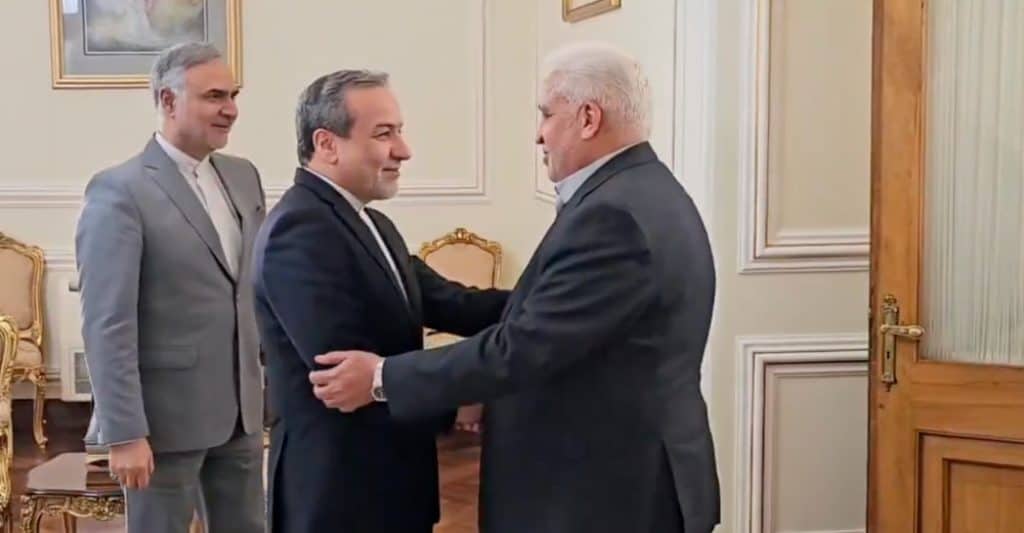
On February 18, Falih al Fayyadh, the chairman of Iraq’s Popular Mobilization Units (PMU), visited Tehran and met with Iranian Foreign Minister Abbas Araghchi, according to a report in Iranian state media. Fayyadh “stressed the strategic relations between Iran and Iraq,” IRNA reported. This development is notable after calls in Iraq to disarm some of the Iran-backed militias that are part of the PMU. With the fall of the Bashar al Assad regime in Syria, Iran seeks to shore up the groups it backs in the region.
The PMU includes numerous militias in Iraq. Its most powerful groups, such as Kataib Hezbollah, have been designated foreign terrorist organizations by the US. The US State Department singled out Fayyadh for his role in human rights abuses during the suppression of protests in Iraq in October 2019. Militias under the umbrella of the PMU were involved in killing protesters.
Iranian state media appeared to downplay Fayyadh’s visit. For example, IRNA’s reporting on the event was buried at the bottom of a report about Araghchi’s meeting with Ziyad al Nakhaleh, the head of Palestinian Islamic Jihad (PIJ). It’s unclear why the meeting was not given the same attention as Araghchi’s meeting with Nakhaleh, though it could be due to Iran’s intent to highlight the regime’s support of the Palestinian cause.
The two meetings with Iranian-backed groups in two important arenas signal Iranian efforts to reconnect with these regional groups at a critical juncture. PIJ has played a key role alongside Hamas in the Gaza war after the October 7, 2023, attacks on Israel. Iraqi militias in the PMU have been involved in numerous attacks on US forces in Iraq and Syria and attacks on Israel since October 7. The meetings also come as Iran hosted the emir of Qatar on February 19 and prepares to deal with a new US administration.
In the meeting in Iran, Araghchi indicated he “appreciated the Popular Mobilization Forces’ efforts to secure Iraq’s stability, especially during the fight against the ISIS and its positive impact on sustainable security in the region,” according to IRNA. “The two sides reviewed the latest regional developments and the ways to support the two countries’ common interests.”
According to a report by Iran International, a London-based media organization that is critical of the Iranian regime, Fayyadh also met with Ali Akbar Ahmadian, a former Iranian rear admiral and officer in the Islamic Revolutionary Guard Corps (IRGC) who has served as the head of the Supreme National Security Council (SNSC) since 2023. Iran International characterized Ahmadian as representing Iranian Supreme Leader Ayatollah Khamenei in the meeting. The report said Fayyadh “asked the Iranian Supreme National Security Council to intervene to resolve the differences between the various Iraqi forces.”
The Iran International report added that Fayyadh is facing attempts to challenge his leadership from within Iraq. “While Prime Minister Mohammed Shia al-Sudani and former Prime Minister Haider al-Abadi support his continuation, three political blocs led by Hadi al-Amiri, Nouri al-Maliki, and Akram al-Kaabi are seeking to oust him.” Sudani is under pressure to rein in the PMU militias. Abadi played a key role in legitimizing the militias and providing them an official role in Iraq as a salaried paramilitary force between 2016 and 2018.
Fayyadh was Iraq’s national security advisor before officially transitioning into the role of chairman of the PMU in 2020. The report indicates that Amiri, head of the Badr Organization, which has numerous militias within the PMU, and Kaabi, the head of Harakat Hezbollah al Nujaba, now oppose Fayyadh. Several reports have highlighted internal debates about Fayyadh’s future in Iraq. The Arab Weekly noted that Asaib Ahl al Haq and its leader, Qais Khazali, oppose Fayyadh.
Various Arabic reports about Iraq’s internal discussions about the future of the PMU appear to break down into two factions: those who want the militias to remain powerful, linked to Iran, and more independent of state control, and those who would like to see flexibility and further incorporation of the militias under state control. The debate also involves questions about Iraq’s sovereignty, Iran’s involvement in Iraq, and how Iraq will position itself in relation to the new Trump administration.







